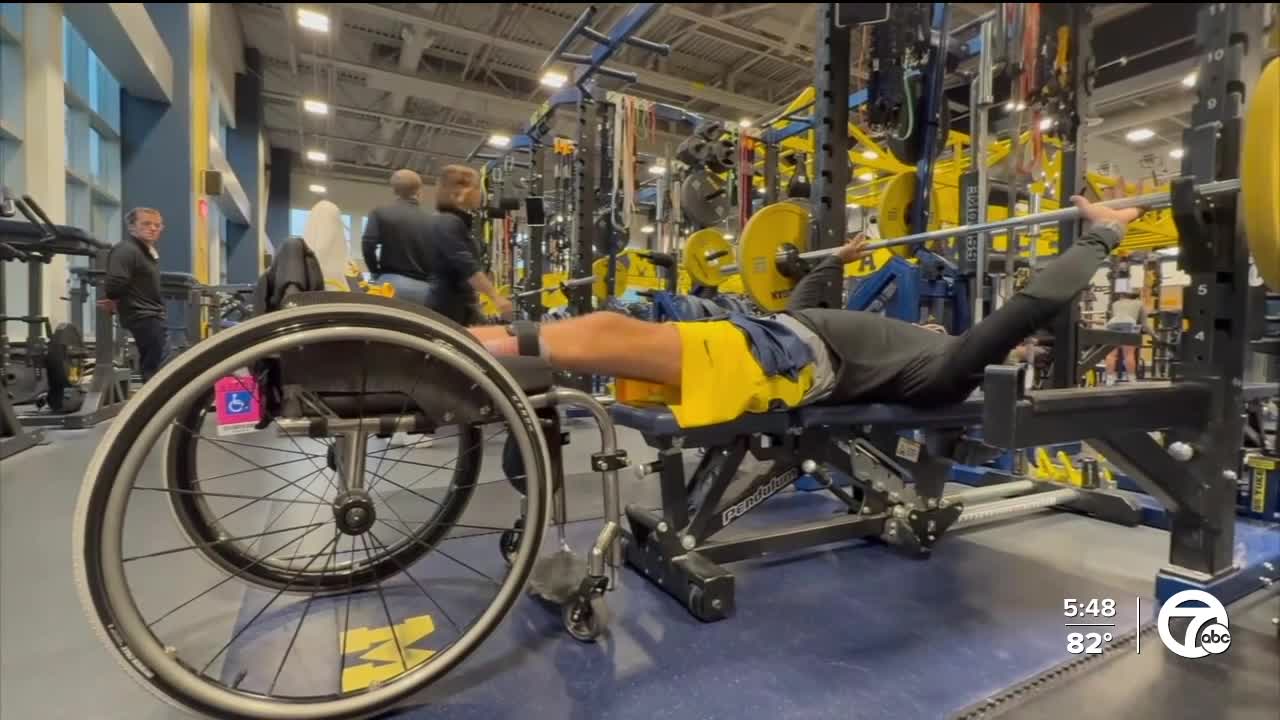ANN ARBOR, Mich. (WXYZ) — The University of Michigan is creating more opportunities for students with disabilities through its expanding adaptive sports program, which now includes the nation's first collegiate para powerlifting team.
Watch Jolie Sherman's video report:
The school's adaptive sports and fitness program, which began in 2019, already offered four wheelchair sports, including tennis, basketball, rugby, and track and field, before adding competitive para powerlifting this year.
Abbey Phillipson, who serves as both the strength and conditioning coach for Michigan's adaptive sports program and head coach of the new para powerlifting team, is proud of the groundbreaking initiative.
"Recently, we became the first ever and only collegiate para powerlifting program, which I had the opportunity to start," Phillipson said.

Phillipson has Classical Ehlers-Danlos syndrome and is a big advocate of the adaptive sports community. In high school, she had stage 5 spondylolisthese and used a wheelchair.
"I'm actually super stretchy and elastic," she said in reference to her skin. "My body doesn't deposit collagen correctly to my connective tissues."
The U-M grad teaches her eight athletes how to bench press without using their legs, which presents unique challenges.
"We see from research that 10-20% of your bench press max strength is from the use of your leg drive. So, we always look around at each other when our legs are strapped up on the table, and we're like, we must be pretty strong," Phillipson said.
For athletes like Caden Baxter, who suffered a spinal cord injury at age 15, the program has been transformative.
"Being young when I was injured, I wanted to get back into sports immediately, I just didn't see a way," Baxter said.

That changed when Baxter got into Michigan and discovered adaptive sports, specifically wheelchair tennis. During his senior year, he became one of the first adaptive wheelchair athletes to sign an NIL deal. Now pursuing a master's in sports management, he's joined the para powerlifting team.
WEB EXTRA: Dr. Feranmi Okanlami, U-M Director of Adaptive Sports & Fitness, talks about the school's adaptive sports program
"This is an outlet that feels very similar to all the sports I've competed in when I was young. You're still able to train, you're still able to compete, you get the community aspect of sport," Baxter said.
The training regimen is rigorous, with athletes in the gym three days a week during the school year and early mornings throughout summer.
"We'll have small breaks in November, but then we'll be right back to it, national records don't wait for you," Phillipson said.
The team attended their first competition in June, where all members qualified for nationals. Last month, Jillian Crawford became a national champion by lifting 169 pounds.
"I was just really happy because all the work I did really paid off, and I can see how there's a big difference in how I used to lift," Crawford said.

Crawford, who is entering her senior year, says adaptive sports have transformed her life and helped her find community.
"It's something that I really enjoy, and something that gave me back movement and just having fun with sport," Crawford said.
————————————
This story was reported on-air by a journalist and has been converted to this platform with the assistance of AI. Our editorial team verifies all reporting on all platforms for fairness and accuracy.




